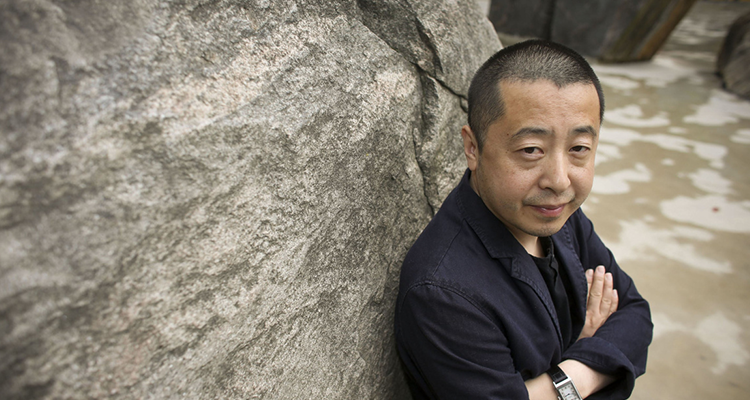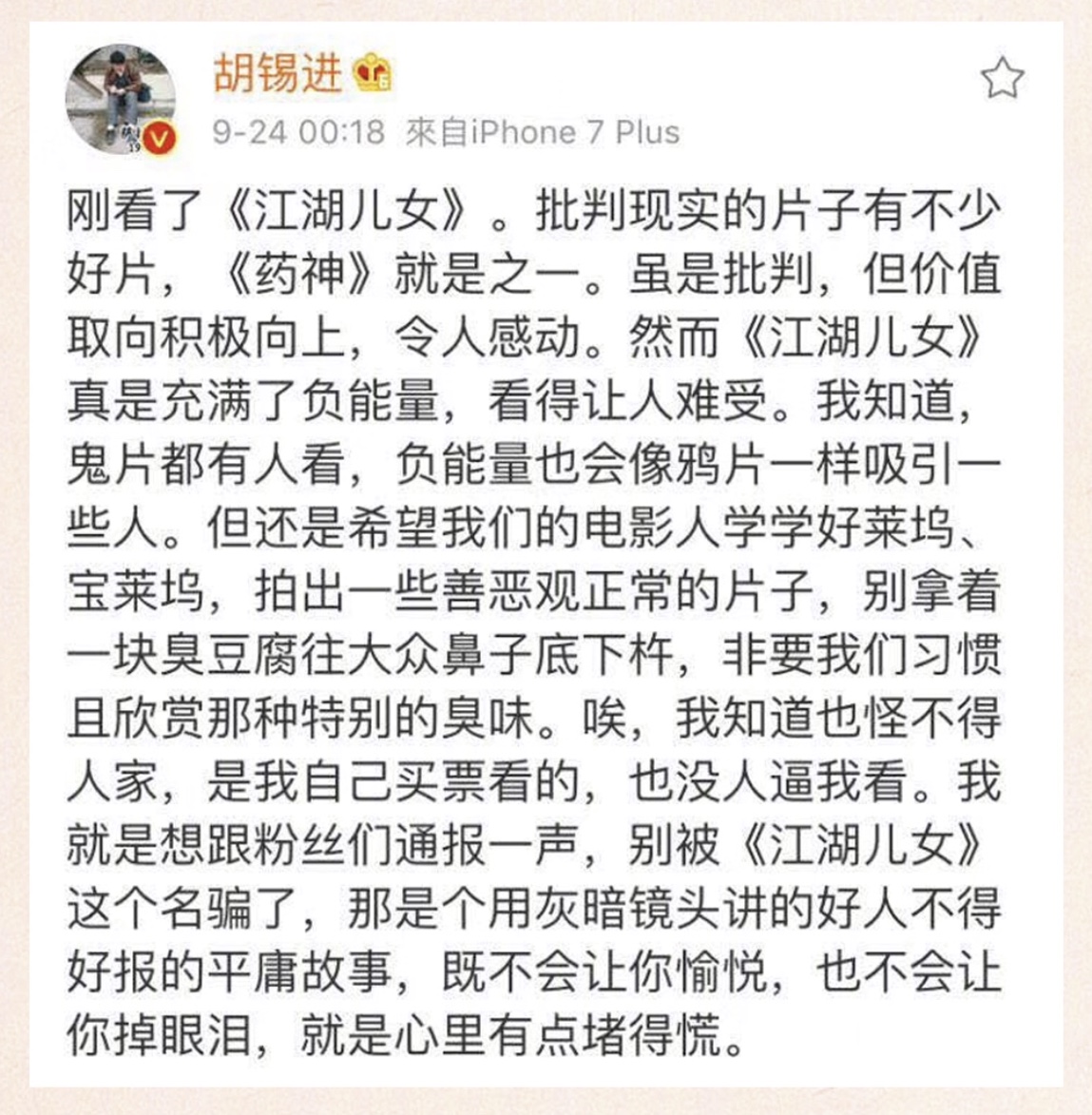Director Jia Zhangke roasts Hu Xijin over his review of ‘Ash Is Purest White’
Director Jia Zhangke roasts Hu Xijin over his review of ‘Ash Is Purest White’

It’s widely acknowledged that Hu Xijin 胡锡进, Editor-in-Chief at the nationalist tabloid the Global Times, has many opinions.
Aside from performing editorial work, he uses social media to whine about things that irritate him in thousands of ways. While most of his enemies chose to ignore his rants, Hu’s latest Weibo post, in which he gives a negative review of Jia Zhangke’s new movie Ash Is Purest White, has brought him under fire, making him a subject of ridicule by internet users who have long been disgusted by his takes that literally no one is asking for.
In a now-deleted post that initiated the dispute, Hu criticized Jia’s movie of making him uncomfortable due to its “negative energy.” He said:

I just watched ‘Ash Is Purest White.’ There are a lot of movies trying to tackle real-life issues in a critical way. For instance, ‘Dying to Survive’ is one of them. Although its overall tone is condemnatory, the values it conveys are fairly positive. By contrast, ‘Ash Is Purest White’ is full of negative energy, which makes me uncomfortable.
I am aware that some people love to watch horror movies and negative energy can also attract audience in a way like how opium gets people hooked. But I still hope filmmakers in China can study movies created by Hollywood and Bollywood and produce some movies with normal views about what’s good and what’s evil.
Please don’t place stinky tofu under our noses and force us to get used to that particular smell. Ugh. I know I can’t blame others because I bought the ticket and no one forced me to watch it. But what I’m doing here is to caution my fans no to be deceived by the movie’s title. It uses gloomy style of filming to tell a banal story of how nice people don’t get properly rewarded for good deeds. It’s neither pleasant nor sad enough to bring you to tears. It only makes you frustrated and upset.
Does Hu have a point? I have not seen the movie myself, so I can’t really judge his criticism of the movie. But one or two things are evident in this single post, like Hu apparently abhors dark movies that contain too much “negative energy” and deviate from mainstream values. Or to put it more directly, movies that fail to delight him are generally considered bad by his own standards. Also, as an opinion leader with more than 15 million followers on Weibo, he hoped to leverage his influence to discourage people from seeing ‘Ash Is Purest White,” which, understandably, prompted the director to publicly address his criticism.
In a letter (in Chinese) posted on Jia’s Weibo on September 25, he first apologized for putting Hu in a bad mood during the Mid Autumn Festival. He then went on to challenge Hu’s review by listing off 12 masterfully crafted arguments and delivered them in the nicest way possible.
In response to “negative energy,” Jia said,
“My understanding of energy is that it should be based on telling the truth. Facts are the biggest positive energy. Resistance to seeing the reality is negative energy. Being blind to what’s really going on will make you unable to tell the truth. And that will generate more negative energy. This is basically what the phrase ‘seeking truth from facts’ is about. Do you agree?”
Regarding Hu’s dislike for spooky movies about ghosts, Jia came to the defense of horror movie fans,
“I never directed a horror movie so I don’t have enough experience in this category. But it should be clear that there is no supremacy of one class of movie fans over another. In addition, since you are an atheist, is it strange that you have opinions about ghosts?”
Jia also took shots at Hu’s criticism of his work,
“As to my gloomy style of filming, do you rely too much on Meitu in your daily life? I believe that real beauty is based on truth. If you can accept the diversity of beauty, you’ll find the world prettier.
“I always possess a curiosity for wonder stories, but I tend to try my best to understand banal lives of ordinary people and are often touched by their stories.”
In the final point, Jia went a bit personal,
“Feeling frustrated is actually a complex reaction to a movie. It’s a powerful emotion. You’ve been numb for so long. You being frustrated after seeing my movie proves that you still have emotions. Congrats! Your frustration makes me hopeful for the future of this complex China.”
Completely owned by Jia, Hu later admitted (in Chinese) that his review is by no means professional, complaining that it’s difficult to argue with his opponent when Jia has claimed the moral high ground of “facts are the biggest positive energy.” However, he said there are two lessons he learned from the dispute. One, moving on, he will never choose which movie to see solely based on its title. Second, he’ll be more cautious when criticizing people on Weibo, especially when it comes to movies.






